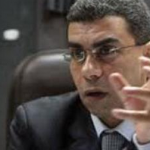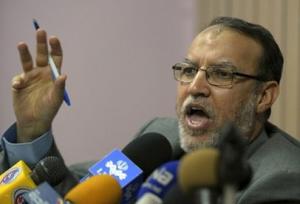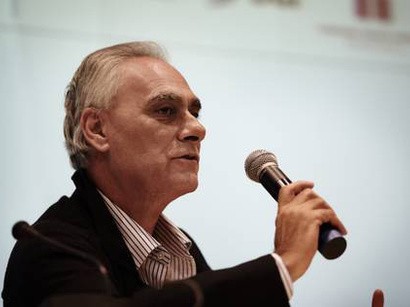Columnists continue to dissect Morsy’s recent constitutional declaration that some say sets the president up as a modern day pharaoh. Many writers believe his move was planned as revenge on the judiciary. Others believe he merely needed to reinstate the power of the office of the president after some political powers had refused to negotiate with him on the constitutional draft.
On the way to catastrophe
Emad Al-Din Hussein
Al-Shorouk newspaper
Egypt will drown in chaos if President Morsy does not back off from his new constitutional declaration, states Hussein. Egyptians slipped into a hazardous stage shows signs of an incipient civil war, as conflicts continue in Tahrir Square and nearby.
Those opposing and supporting Mosry’s decisions plan massive protests on Tuesday. Many anticipate that such demonstrations will end up causing more casualties. Political differences are valid, but continuing clashes in all governorates looks like a rehearsal for a more serious development, says Hussein.
Looking at the roots of the polarisation, the writer suggests that Morsy should revise his decision or at least re-evaluate the risk of the negative consequences of his controversial declaration. Regardless of who guided Morsy to announce his decree, all parties are responsible in the clashes which are ongoing. Instead of calling on secular groups to gather in Tahrir, Hussein believes it would have been better to allow the president the chance to retreat in a calmer way.
Whoever led Morsy to make the decision definitely failed to correctly gauge the public reaction. The main question remains: where is the exit to this maze? Egyptians are heading to nowhere if not a genuine civil war, warns Hussein.
Who speaks on behalf of the army?
Wael Qandil
Al-Shorouk newspaper
The current political crisis does not require any involvement from the army, says Qandil. Amid an atmosphere of confusion, the writer argues that nobody should speak on behalf of the military, or appeal to the armed forces at this stage. When political parties treated the army as a saviour after the 25 January revolution, the consequences were catastrophic.
It seems that everyone ignored the fact that the uprising struggled to push the Supreme Council of Armed Forces out of politics. Qandil was shocked to see that those who used to chant against the army are now calling for the military to intervene in Tahrir.
The writer recalls his last piece, in which he explored the army’s interference in politics. Blaming the junta or calling upon it for assistance used to be a “normal thing to do” during the military rule. Now that authority lies with a civilian elected president, Qandil believes that pushing the army into the current conflict is a futile attempt to resolve the situation.
In order to find a proper solution to the crisis, the writer recommends that those political figures relevant to the developments should work something out. No need to think of the armed forces as a lifesaver for Egypt in this period, he says.
An existing coup and a potential coup
Yasser Rizk
Al-Masry Al-Youm newspaper
Rizk would have liked to have seen Morsy read his constitutional declaration carefully before he announced it. He he would love to know if the president even consulted knowledgeable constitutional experts and intellectuals before making his announcement. The writer criticises Morsy’s new decree and states it seems that he has forgotten about being a president for all Egyptians, not just for his Islamist group.
If figures like Hamdeen Sabahy, Mohamed ElBaradie and Amr Moussa are accused of attempting to overthrow the regime, Rizk believes that Morsy should then be accused of igniting a coup d’état. Morsy has overstepped his powers and has broken his three pledges to respect previous constitutional declarations.
However Morsy still has the chance to control the situation, by announcing a U-turn on his declaration. If he does so, Egypt will immediately overcome a difficult and escalating situation. Rizk, however, thinks that the president will pay more attention to the same advisers who pushed him to make his recent declaration. He probably will not reassess the increasing public frustration.
The writer addresses Morsy and asks: “do you want the revolution to turn into a constitutional coup? Please let go of your stubbornness and change your mind. Remember your predecessors!”
A big dilemma
Hamdy Qandil
Al-Masry Al-Youm newspaper
One of Morsy’s main reasons for announcing the constitutional declaration was to take revenge on the judicial authority, says Qandil. Dissecting Morsy’s recent decisions, the writer believes that the president could not forget his embarrassment that followed the refusal of ex-Prosecutor General Abdel Meguid Mahmoud to accept being relegated to a diplomatic post at the Vatican.
Morsy’s new declaration, which cannot be repealed by the judiciary denote his frustration with them. The move upsets the separation of powers and causes a clear imbalance between them. The president wanted redress for the constitutional court decision to dissolve parliament, Qandil states. Therefore, he issued a statement forbidding the court to dissolve the Constituent Assembly or the Shura Council.
Morsy also wanted to prove to Egyptians his ability to exercise control in the wake of the security situation following the recent Mohamed Mahmoud Street clashes. He wanted to reinstate his strong position after some political powers refused to hold talks with him to discuss the constitutional draft.
Morsy sweetened his announcement by increasing financial compensation for the injured of the 25th of January revolution and trapped his people in a deep hole. Morsy has turned from being an elected president to Egypt’s new pharaoh, Qandil concludes.
The delusion of tyranny as a prerequisite to stability
Amr Hamzawy
Al-Watan Newspaper
Hamzawy unleashes his criticism on what he describes as Morsy’s flawed discourse, which is applauded by the Muslim Brotherhood and its political wing, the Freedom and Justice Party. He accuses the staunch Brotherhood apologists justifying the “temporary totalitarianism” of Morsy’s constitutional declaration as lacking the ability to learn from history. He regards the Brotherhood’s advocacy of the neutralisation of the judiciary and the ceding of its powers to the president as an outright advocacy for “justice of the dictator”.
Hamzawy examines what he considers flawed excuses made by the Muslim Brotherhood to portray Morsy’s decisions as indispensable for achieving the revolution’s objectives. While the declaration stipulates retrials for those charged in connection with the killings of protesters during the 18-day revolution of 2011, Hamzawy sees no reason not to extend these retrials as far as the recent incidents of in Mohamed Mahmoud Street, for which he blames President Morsy.
Hamzawy warns the ruling party that lurking threats could materialise as a consequence of believing that totalitarianism, whether temporary or permanent, could ever lay the foundation for stability.







